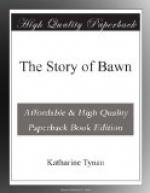“I shall go and see Bridget Kelly,” I said, “while you rest. And when I come back you will be better.”
“Not alone, Bawn?”
“You seem to forget I am twenty.”
“But—a country mouse—and other things. I went about freely when I was your age, though the time was far more strict. But I could not let you walk about the city alone, child. Your grandmother would have a fit if she heard of such a thing.”
At last I prevailed on her to let me go, on the understanding that I should take a cab which should wait to bring me back. I had a thousand times rather have had one of the outside cars, but I knew she would not hear of it unless she was with me, so I resigned myself to the stuffiness and rattling of a Dublin cab.
We crossed the city and climbed a steep hill and came presently to a region of darkness and desolation as it seemed to me, in which the houses were intolerably dreary—high, black houses that shut out the sky, fallen on evil days, since they were all sooty and grimy, with windows which had not been cleaned for years, many of them broken, and twisted and rusty railings guarding the areas.
I shuddered at the thought of the people who lived in such places.
I could see that they had once been places of consideration but now they were slums. Here and there a mean shop stood out, or the old house had been turned into a pawn office, or a builder’s or baker’s. Dirty children sat on the pavements or played in the gutters, while their dirty mothers gossiped in groups; and the men lounged to and from the public-houses, which were, indeed, the only bright spots in those dreadful streets.
I was relieved, when at last the cab stopped, that I had come to the end of my journey.
The last street down which we had driven was drearier than the rest, in a sense, but more respectable. There were wire blinds to all the lower windows, and there was no sign of life in the short street from end to end.
Our house crossed the end of the street, which was in a way an approach to it. It stood within stone walls, and was a great square building with wings thrown out, the style of it the pseudo-classical which was so much in favour in Ireland in the eighteenth century.
There was a great gate in the middle of the long wall; at one side of it a postern, which I pushed and found to be open. Bidding the driver wait for me I passed within.
I went up a flight of steps, under Ionic pillars, to the double hall door. I found that that, too, stood open, and I went into the hall, which was very dark despite the June sunshine without. It was an imposing hall paved with black and white marble, and the stairs ascending from it were of the same material. I was struck by the beautiful stucco work of the walls and ceiling. But dust and grime lay on everything and the air of the place struck cold.
I went back to the hall door and rang the bell, which echoed somewhere down in the lower regions of the house; but there was not a sound except that.




